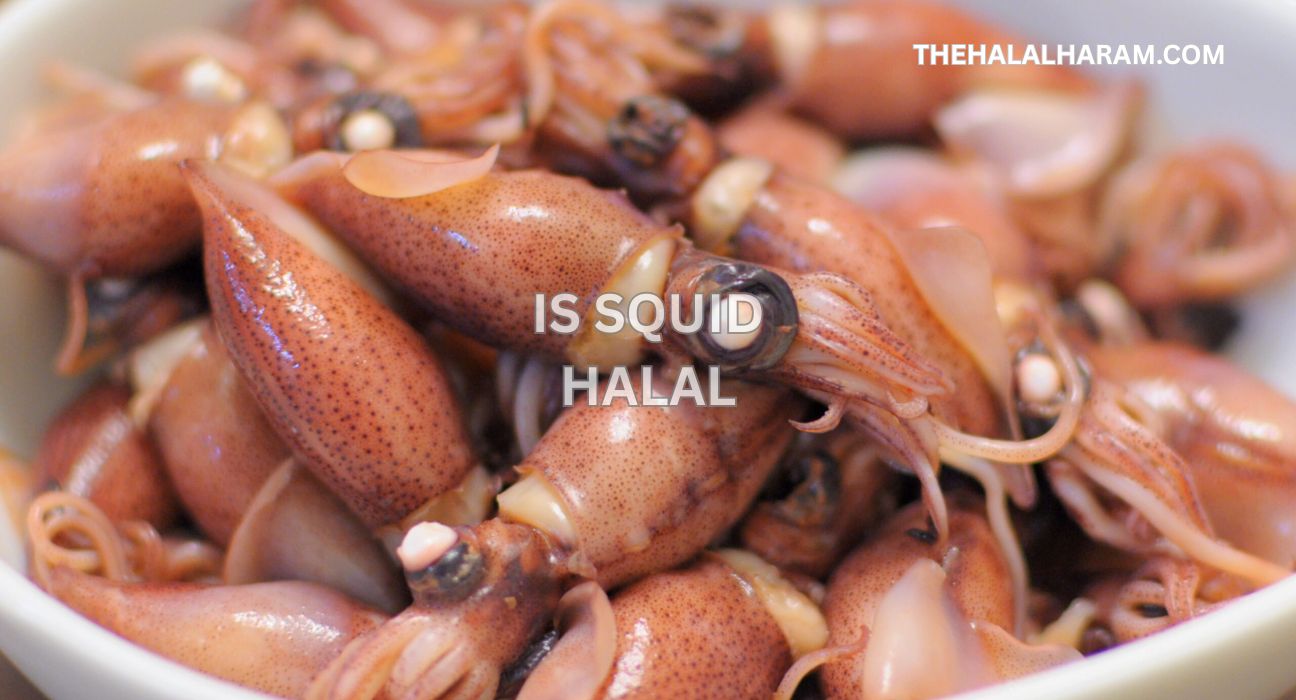Is Squid Halal? Complete Guide for Muslims in 2025
Introduction
Is squid halal? Many Muslims who enjoy seafood wonder this whenever they see squid on a menu, whether in sushi bars or as crispy, fried rings. To answer the question, we have to look at what Islamic dietary rules tell us about the ocean’s bounty.
Read More: Are Skittles Halal in USA
What Does Islam Say About Seafood?
Islamic Rules for Halal Seafood
Islam generally permits nearly all seafood. The Quran describes sea food as lawful, and while all scholars agree that fish is always halal, they don’t see eye to eye on creatures like squid, octopus, and crabs.
Views from Different Islamic Schools of Thought
The Shafi’i, Maliki, and Hanbali scholars say squid is halal, believing anything that swims in the sea is lawful to eat. The Hanafi school, however, is stricter, permitting only fish, and because squid is not a fish, some Hanafis choose not to eat it.
Is Squid Halal in the Quran and Hadith?
Quranic References Related to Sea Creatures
In Surah Al-Ma’idah (5:96), the Quran states, “Lawful to you is the game from the sea and its food as provision for you…” Scholars refer to this verse to support the allowance of many sea creatures, squid included.
Hadith References on Seafood
The Prophet Muhammad (PBUH) said, “The water of the sea is pure, and its dead creatures are lawful.” This saying supports the idea that sea animals, including squid, can be halal even without the ritual slaughter required on land animals.
Understanding the Nature of Squid
Is Squid a Fish or a Mollusk?
Squid is classified as a mollusk, not a fish. It has a soft body with no true bones and moves through the water by expelling water in jets. This biological detail is especially important for Muslims who follow the Hanafi school of thought.
Why Some Muslims Avoid Squid
Some Muslims choose not to eat squid because it is not categorized as a fish. They rely on the advice of scholars who urge caution around sea creatures that do not fit the fish definition.

Is Squid Halal According to Scholars?
Shafi’i, Maliki, and Hanbali Opinions
The Shafi’i, Maliki, and Hanbali schools of thought accept that squid is halal. They hold that all sea animals are permissible to eat, whether or not they are technically fish. Therefore, followers of these schools can eat squid without concern.
Hanafi Scholar Opinions
Hanafi scholars usually rule that only fish are halal from the sea. Since squid is a mollusk, it does not meet this criteria. However, some modern Hanafi scholars may permit squid if it is widely accepted and does not pose a health risk.
Does Squid Need to Be Slaughtered Islamically?
Slaughter Rules for Seafood
Seafood does not need the same type of slaughter as land animals. Most scholars agree: if a sea creature is dead and fresh, it is halal to eat.
Squid and Slaughtering Practices
Because squid lives in the ocean and is typically cooked fresh or frozen, there is no Islamic slaughter requirement. This means squid is straightforward to manage under halal guidelines.
Halal Status of Squid in Different Countries
Is Squid Halal in Muslim Countries?
In places like Malaysia, Indonesia, and Saudi Arabia, squid is a common food. Local Islamic bodies consider it halal, and you will find it on the menu in halal-certified restaurants.
Squid in the Western World
In Western nations, squid might not carry a halal label. However, the squid itself is the same. You should confirm that it was kept clean and safe from contamination.
Common Dishes with Squid and Their Halal Status
Is Calamari Halal?
Calamari is simply fried squid. If the squid is halal, and it is cooked in halal oil without haram ingredients, then it is halal to eat. Always check what oil or breading is used.
Squid in Asian Cuisine
Squid is a favorite ingredient in Chinese, Korean, and Japanese cooking. When the recipes avoid alcohol-based sauces and haram broths, they can be halal-friendly.
Key Ingredients to Watch For in Squid Dishes
Alcohol in Sauces
Rice wine, mirin, and some soy sauces contain alcohol, which can render a squid dish non-halal. Always read ingredient labels or check with the restaurant staff.
Cross-Contamination
Squid cooked in the same fryer or grill as pork or other non-halal ingredients can become contaminated. Seek halal-certified kitchens and ask for dedicated cooking tools.
What Should You Ask Before Eating Squid?
Questions at Restaurants
Here’s what to ask:
- Is the squid fresh or marinated?
- Was any alcohol used in the marinades or sauces?
- Is it fried in the same oil as pork or haram seafood?
These simple questions help ensure you stay within halal guidelines.
Buying Squid from the Market
Look for halal certification on the packaging. Frozen squid is okay if it has no alcohol-based marinades. Rinse it thoroughly before cooking to ensure purity.
Is Squid Halal in Islam?
In Islam, many scholars from the Shafi’i, Maliki, and Hanbali schools consider squid halal because it lives in the sea. However, the Hanafi school is stricter and does not classify squid as halal since it’s not a fish. So, views may vary based on your school of thought.
Is Squid Halal in Quran?
The Quran says that all seafood is lawful in Surah Al-Ma’idah (5:96), which many scholars use to say squid is halal. It does not name squid directly but supports the general idea that sea creatures are permissible. This verse gives a strong base for allowing squid.
Is Squid Halal to Eat?
Yes, squid is generally halal to eat if it’s clean and not cooked with haram ingredients. It doesn’t need to be slaughtered and is eaten widely in halal meals. But Muslims should avoid it if they follow a school that restricts non-fish seafood.

Final Verdict: Is Squid Halal?
So, is squid halal? Most Islamic scholars say yes—this view is especially strong among Shafi’i, Maliki, and Hanbali followers. Hanafis tend to be more cautious and may choose to skip it unless reassured otherwise. Since it’s a sea creature, squid doesn’t require traditional Islamic slaughter. As long as it’s cleaned properly and isn’t cooked with alcohol or other haram ingredients, Muslims can eat it with a clear conscience. Just be sure to double-check how it’s prepared, especially when dining out.
Read More: Are Eggs Halal
Frequently Asked Questions
1. Is squid halal to eat in Islam?
Yes, most Islamic scholars allow squid because it is a sea creature. However, some Hanafis avoid it since it’s not a fish.
2. Do all Islamic schools agree that squid is halal?
No, they don’t all agree. Shafi’i, Maliki, and Hanbali schools say squid is halal, but many Hanafi scholars do not.
3. Does the Quran say squid is halal?
The Quran permits seafood in general. Since squid lives in the sea, many Muslims believe it falls under that permission.
4. Can I eat squid if I follow the Hanafi school?
You can if your local scholars allow it. Some Hanafis permit squid based on custom or new interpretations.
5. Does squid need Islamic slaughter to be halal?
No, you don’t need to slaughter squid the Islamic way. Most scholars agree sea creatures don’t require it.
6. Is calamari halal if made with squid?
Yes, calamari is halal if the squid is clean and cooked without alcohol or haram ingredients.
7. Can Muslims eat squid in non-Muslim countries?
Yes, but they should check for contamination or non-halal sauces before eating squid from restaurants or stores.
8. Are squid dishes in Asia halal?
Some are halal, but many Asian recipes use alcohol-based sauces. Always ask before eating.
9. Is frozen squid from supermarkets halal?
Yes, frozen squid is usually halal if it’s plain. Avoid any with marinades containing alcohol or doubtful ingredients.
10. Why do some Muslims avoid squid even if it’s seafood?
They avoid it because it’s not a fish. In Hanafi fiqh, only fish are considered halal from the sea.





